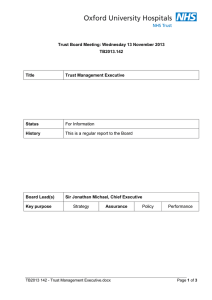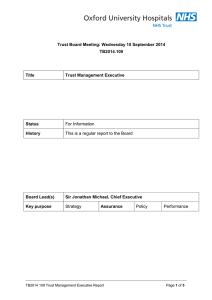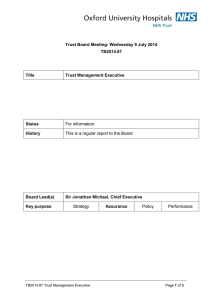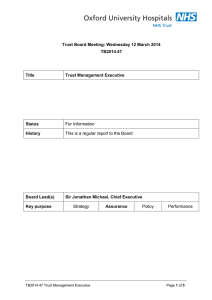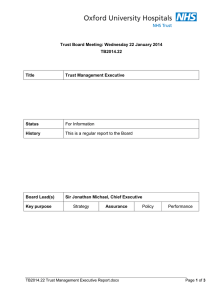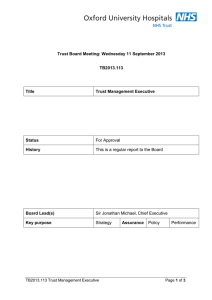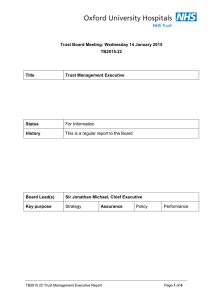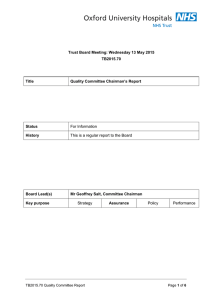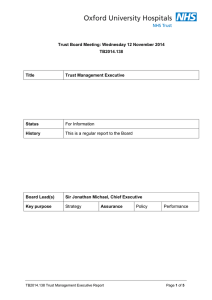Trust Board Meeting in Public: Wednesday 9 September 2015 TB2015.113 Title
advertisement
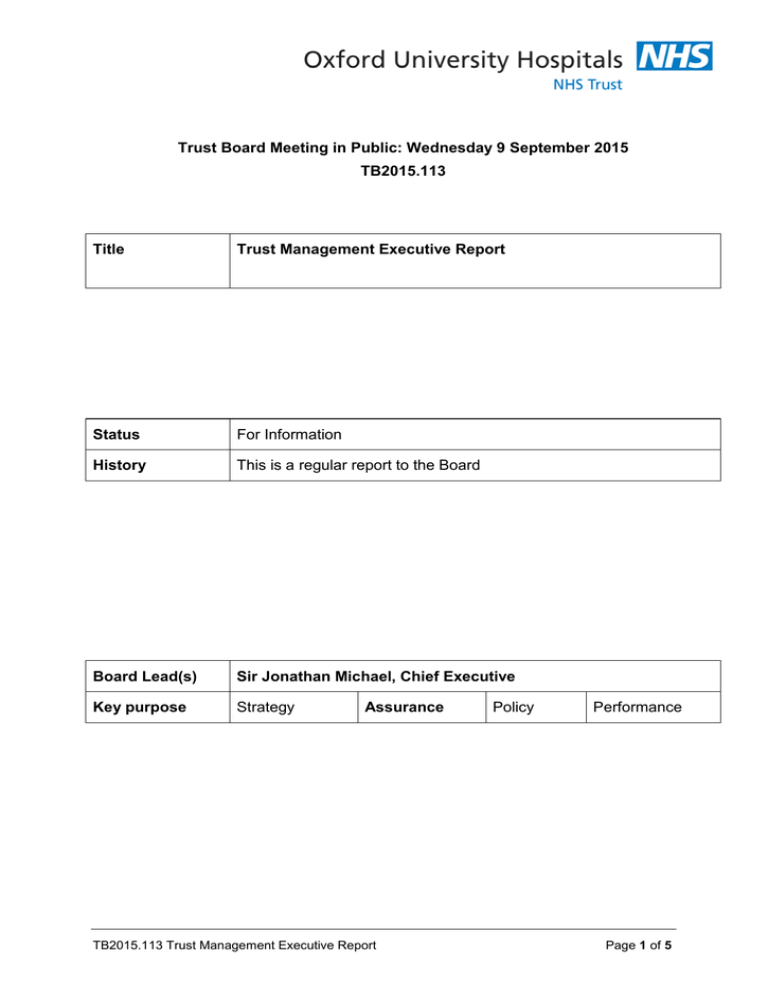
Trust Board Meeting in Public: Wednesday 9 September 2015 TB2015.113 Title Trust Management Executive Report Status For Information History This is a regular report to the Board Board Lead(s) Sir Jonathan Michael, Chief Executive Key purpose Strategy Assurance TB2015.113 Trust Management Executive Report Policy Performance Page 1 of 5 Oxford University Hospitals TB2015.113 1. Introduction Since the preparation of its last report to the Trust Board, the Trust Management Executive [TME] has met on the following dates: • • • • 9 July 2015; 23 July 2015 13 August 2015; and 27 August 2015. The main issues raised and discussed at the meetings are set out below. 2. Significant issues of interest to the Board The following issues of interest have been highlighted for the Trust Board: 2.1. TME has continued to monitor operational performance closely over Months 2 and 3, and has reviewed the outline position for Month 4.. Delivery of operational performance standards in Q1 was achieved ahead of projections, achieving a score of 2 overall against Monitor’s risk assessment framework for Q1, and achieving a score of 0 in June 2015; 2.2. Updates have been provided on the emergent financial position in 2015/16. TME has reviewed the main variances to plan. The underlying trends have been identified to include overspend on pay, and activity under-performance against commissioner contracts. Material corrective actions have been introduced to reverse these trends; 2.3. Action Plans for Urgent Care, Cancer and Elective Care have been kept under review, in the context of the trajectory for operational performance in Q3, in advance of report to the Trust Board at its meeting on 9 September 2015; 2.4. Following the Trust’s self-assessment against the national access standards relating to cancer care, and in advance of making its national submission on plans for the sustainable delivery of the 62 day cancer standard, a new Operational Policy for Cancer Services Teams has been developed in line with guidance from the Department of Health [DH], and by reference to best practice. The key principles of the Policy, as approved by TME, are to ensure that patients experience excellent, compassionate and timely care, minimising unnecessary delays; 2.5. TME has reviewed the Divisional Business Plans, developed by each of the clinical divisions, and discussed in divisional performance reviews. It is proposed that the strategic content of the plans should inform the review of the Trust’s overall strategy, planned for later this year; 2.6. TME noted the plans for implementation of the 2015 NHS Staff Survey, due to commence on 21 September 2015. All members of staff in post as at 1 September (holding a substantive or honorary contract) will receive a Survey questionnaire, to be returned by 30 November 2015; TB2015.113 Trust Management Executive Report Page 2 of 5 Oxford University Hospitals TB2015.113 2.7. TME has received regular updates on the progress of the Trust’s foundation trust application, and on the process of Historical Due Diligence 3 [HDD3], noting the recommendations and action plan for financial reporting procedures, which will be presented to the Trust Board; 2.8. ,At the request of the Quality Committee, TME reviewed the Patient Story Programme, and agreed an approach for the selection of patient stories to be presented for review by the Trust Board, and the Quality Committee. The approach, which recognises that the primary purpose of the patient stories is to provide an insight into, and reminder of, the patient's perspective, will now be pursued for at least twelve months, to allow sufficient time to test its effectiveness. 2.9. Following a presentation made to the TME earlier in the year by Mr Christopher Goard, Non-Executive Director, and after consultation with stakeholders, TME considered proposals to develop a Frontline Innovation Programme; 2.10.TME considered the outcome of the external review which had been undertaken at the Trust’s request of multi-disciplinary team [MDT] working in the service associated with the Oral and Maxillo-facial service. A follow up report is to be provided to TME, with clear recommendations as to what is realistically achievable, consistent with the best interests of patients; 2.11.An update was provided on implementation of the Trust-wide absence management system, since its introduction in April 2014. The system was reported to be more efficient, and Managers report that they feel more in control of managing sickness absence; 2.12.TME heard that there has been continued and sustained improvement in the efficiency of initiating and delivering clinical research at the Trust. Under the National Institute for Health [NIHR] metrics, within ‘League 1’ which consists of the most research-active NHS trusts, OUH is the only trust to have achieved 100% compliance with the 70 day target to recruit the first patient; 2.13.An update was provided on progress in implementation of the CQC’s fundamental standards (replacing previous outcomes/regulations); 2.14.Regular reports were received from sub-committees of TME, including from i. The Transformation and Cost Improvement Programme [CIP] Steering Group; ii. The Workforce Committee; and iii. The Clinical Governance Committee. TB2015.113 Trust Management Executive Report Page 3 of 5 Oxford University Hospitals TB2015.113 3. Key Risks Discussed 3.1. TME has discussed in detail the risks associated with the emergent financial position, including the potential risk that the corrective actions which have been introduced in an effort to reverse the underlying trends may impact adversely on operational and quality performance over a period of time. This will be kept under close scrutiny. 2.1 TME discussed the risk that, if Nurses and Midwives failed to revalidate in accordance with the statutory requirement which is due to come into force with effect from April 2016, the Trust would be in breach of its statutory duty, and would risk the added financial implications of having to rely on additional agency staff to deliver services. The Chief Nurse is liaising further with the Medical Director, and with the Director of Organisational Development and Workforce, to explore the opportunities to develop shared resources across Medical and NMC revalidation. TME will then review the business case for investment to support NMC revalidation; 2.2 TME has reviewed the updated Corporate Risk Register, following quarterly review, and has reflected on the Trust’s Risk Appetite Statement, which is to be considered further by the Trust Board in Seminar. 4. Key decisions taken Key decisions made by the TME included: 4.1. Support for the Outline Business Case for the disposal of freehold lands at Littlemore Park, to be submitted for approval of the Trust Board at its meeting on 9 September 2015; 4.2. Approval of spend against the capital allocation in relation to the Milton Keynes Satellite Radiotherapy Development. This will enable the Outline Business Case to be finalised for submission to the Trust Board (the Strategic Outline Case having been approved by the Trust Board, and by the Trust Development Authority, in July 2013); 4.3. Approval of investment required to complete the integration of activity from Buckinghamshire into the Thames Valley Vascular Network, with OUH as the arterial hub; 4.4. Approval of the procedures for using Closed Circuit Television [CCTV], including the use of visible, body worn cameras by security staff, to provide improved protection for staff and patients against the threat of violence and aggression; 4.5. Approval of Business Cases to replace the theatre chillers on the Horton General Hospital site, and to replace the central medical vacuum plant on the John Radcliffe Hospital site, provision for which has been made within the operational Estates capital allocation, which forms part of the Trust’s 2015/16 Capital Programme; TB2015.113 Trust Management Executive Report Page 4 of 5 Oxford University Hospitals TB2015.113 4.6. Support in principle for proceeding with further development of the Oxford Centre for Interventional Technology, subject to agreeing appropriate governance arrangements, and subject to consideration of a detailed business case in due course; 4.7. Approval of updates to the Private Patients Policy; 4.8. Approval of the External Reviews Policy, to ensure a consistent approach to the management of external reviews; 4.9. Approval of the Terms of Reference of the Workforce Cost Improvement Group; 4.10. Support for the development of a Frontline Innovation Programme, to create a mechanism, within the current Transformation programme for capturing those areas of innovation that are often described as quality/ safety/ service initiatives at a ward based level, or small scale innovation in services. This will not restrict potential research innovations to be included where there is an explicit link to Trust priorities; 5. Future Business Areas on which the TME will be focusing over the next three months include the following: • • • • • • • • • • Monitoring financial performance; Monitoring delivery of operational performance standards; Monitoring quality performance; Monitoring the impact of material corrective actions which have been introduced to deliver a balanced financial out-turn at year end; Update on Diabetes Care; Update on Peer Review Programme; Recommendations for action following the outcome of the external review commissioned of craniofacial services; Outcome of the invited external review of Craniofacial Surgery; Strategic Outline Case for Sterile Services; Update on Operational Performance of Pharmacy 6. Recommendation The Trust Board is asked to note the contents of this paper. Sir Jonathan Michael Chief Executive September 2015 TB2015.113 Trust Management Executive Report Page 5 of 5
